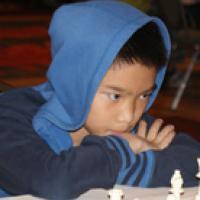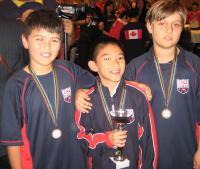
Xiong, Perkins, and Tang win National Titles
From June 8-10, two fierce 8-player round robins were contested by 16 of the most talented, skilled, and tough chess kids in the U.S. One group contested the title of U.S. under-12 Invitational Champion, and the other group U.S. under-8 Invitational Champion. With a time control of 90 minutes plus 5 second increment, the playing schedule which called for 3 games on Saturday and 3 games on Sunday was grueling, and fatigue, focus, stamina, and resilience were key ingredients for success. While all seemed to agree that a four-day schedule would be preferable in future events, this did allow us all to learn something: that these children are not only precociously talented in the arts of combination and positional play, but have the remarkable extra qualities like discipline and determination that we tend to associate only with more seasoned combatants.
A couple quick points about the rules for this event: invitations were made in March, based on the ratings and ages in the USCF February top-100 lists. Thus there could be players in the "under-8" or "under-12" who were already 8 or 12 at the time of the tournament. The only tiebreak in effect was that a player with 4 blacks would win over a player with 4 whites; one section ended in a tie, and since each player had the luck of 4 whites, they were declared co-champions. Also, the event was the first official, rated national championship [I know of] to be played online, thanks to the presence of tournament directors at the various chess clubs from which the kids played.
Efforts were made so that this would be a positive experience for all: there was live video coverage throughout every round; all participants received prizes; standings, results, and games were posted promptly between rounds; and a healthy atmosphere of sportsmanship and camaraderie were maintained throughout the event. When the last game finally ended at 11:30 pm on Sunday, two of the participants came into the coverage chat room to request an under-14 championship for next year, and more emails to that effect followed. Well, this event being a success, I promise we have some events in the works for next year, so stay tuned for a future announcement.
Inspiring Stories
Here are a few tidbits that were truly impressive:
One player in the under-8 section, Taran Idnani, lost his first six of seven games. His seventh game began at 8 pm. Against the highest rated player in his section. If he had lost that seventh game, one could easily imagine appending adjectives like "fatigued, disspirited, over-matched, ready to quit" in the retelling. But from somewhere, this youngster found the determination or inspiration to fight to the last pawn... and win an incredible last round upset.
The lowest-rated player in the under-12 section, Udit Iyengar, was on the verge of sensationally winning his first game of the tournament in round 3, when he accidentally created a three-fold repetition of position that his opponent pounced on. Frustrating? Disspiriting? Normally, yes; and yet in the very next round he went ahead and *did* notch his first upset!
Another under-12 participant, NM Jonathan Chiang complained to me Saturday evening: why were his games always the longest? Why did his opponents keep escaping from bad positions? He thought he was in really bad form and having a bad tournament. Despite which, when the final round rolled around, and 10 pm passed, and all the other players were done with their tournaments, Jonathan worked down to the last minute on his clock chasing a win in the following epic game (which is on the short-list for consideration for the event's "Best Game Prize"):
Resilience does not only come from game to game. It is great to recover after a disappointing game, and clear your mind, and give your best effort in the next one. But another important skill is recovering from a bad move in that very game, and fighting to save it. Daniel Levkov impressed me tremendously from the very first round with his ability to come back from opening disasters. Witness the following two positions:
Daniel won the first, and drew the second!
A similar tale is as follows:
The story: white is 2400-rated Jeffery Xiong. Seeing a previous game of Roland Feng's, he spent the short break between rounds searching for a way to break his opponent's opening, and found the brilliancy above. In the position above, Roland is in a losing position, with his opponent having barely spent a minute to bash out the moves. Intimidating? Probably hopeless? Normally yes, and yet... Roland scrapped his way to a half a point anyway.
In the under-8 section, Joaquin Perkins was one of the higher-rated players who could have entered the event aiming for first. Starting off with back-to-back losses, he had to set his sights on some more modest goal like not losing every game, or just playing well in his next game. He managed to do that... five games in a row and finally tie for first place!
Which brings us to the...
Winners


Ethan Tang and Joaquin Perkins became U.S. under-8 Invitational Co-Champions, tying for first with 5/7, a bare half-point ahead of Jason Metpally and the early leader Daniel Levkov. Going into the last round, there were a few players who could win the championship, and the title came down to two nail-biting games, in which both eventual champions had to survive many a scare. These games easily kept young fans up past their bed-time to watch live video coverage:
And the last game of the section to end:
A worthy Championship game!!
The under-12 was not as close a race-- FM Jeffery Xiong (pictured thinking at the beginning of the story), outrating the rest of the field by about 180 points was every bit as impressive as his rating, clinching the title in round 6. Here is one of the key games, in which he defeated the other early leader, NM Cameron Wheeler:
Jeffery finished with 5 wins and 2 draws, 1.5 points ahead of second place Roland Feng with 4.5/7.
There are too many great stories to tell and great games to review; so if you'd like to learn more about this event, you can check out the following links for complete standings, results, games, archived video coverage, photos, etc.: under-8 and under-12; and stay tuned for a further report on Chess.com and an article in ChessLife for Kids.
The event was sponsored by Chesskid.com, organized by myself, and made possible by 16 terrific young chess players, 32 devoted parents, many dedicated chess club managers and tournament directors, one PinkHamster (Chesskid.com content manager, David Petty), one HealthyChicken, and Susan Houston and Bill Hall at the USCF.


